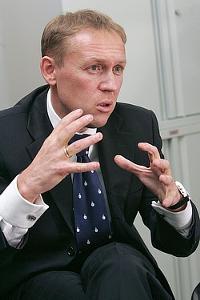Lugovoi convinces that Britain is involved in Litvinenko killing

British prosecutor’s chief suspect in the case of killing Litvinenko said Thursday he had evidence that the British intelligence services had a hand in the slaying – tit will likely further damage relations between Moscow and London.
Andrei Lugovoi told reporters at a news conference in the Russian capital that he had evidence to back up his claim but would only give details to Russian investigators. Lugovoi, a Moscow businessman, met with Litvinenko Nov. 1, hours before Litvinenko fell ill,
Britain's Crown Prosecution Service on Friday formally requested Lugovoi's extradition to face murder charges. Russia refused to hand him over, but said it could prosecute him at home if Britain presents enough evidence.
Lugovoi described the British accusations as an attempt to divert attention from Litvinenko's contacts with Britain's spy services. Litvinenko, Lugovoi said, tried to recruit him to work for MI6, Britain's foreign intelligence agency, and gather compromising materials about Russian President Vladimir Putin.
"It's hard to get rid of the thought that Litvinenko was an agent who got out of the secret service's control," Lugovoi said. "Even if the secret service didn't kill him itself, it was done under its control or connivance."
The British Foreign Office declined comment.
Lugovoi's allegations seem certain to further split Moscow and London over the sensational murder case. Litvinenko died on Nov. 23 in a London hospital after ingesting a massive dose of radioactive polonium-210. In a deathbed statement, he accused Russia's President Vladimir Putin of being behind his killing.
After saying nothing about spy allegations for months, Lugovoi told reporters that the British security services were unhappy with Litvinenko for boasting of his contacts with senior MI6 officials and spilling secrets.
Lugovoi claimed that Boris Berezovsky, a Russian billionaire living in self-exile in London who is among Putin's most powerful political foes, might have also have been involved in the death of Litvinenko. Lugovoi said Litvinenko was angry after Berezovsky, his longtime friend and patron, cut a living allowance he paid Litvinenko.
Lugovoi, himself a former KGB agent, claimed that Litvinenko told him he could prove that the tycoon received political asylum in Britain under false pretenses.
Russia has long sought Berezovsky's extradition to face charges of financial crimes that date back to the 1990s, when Russian state assets were snapped up by politically connected entrepreneurs at discount prices. Berezovsky says the charges are politically motivated.
Lugovoi claimed that Berezovsky,who briefly served as a deputy secretary of Russia's presidential Security Council during the 1990s, also was an MI6 agent and gave British intelligence sensitive information about Russia.
Berezovsky on Thursday denied Lugovoi's allegations, and said they were part of a Kremlin effort to divert attention from itself.
"It is absolutely false," Berezovsky told The Associated Press. "MI6 absolutely knows who are agents for its organization, it knows Berezovsky is not on that list. This is not the story of Lugovoi, this is the story the Kremlin wants to present to the world. The Kremlin in a corner. Putin is in a corner."
Lugovoi claimed Litvinenko tried to recruit him during one of several business trips to Britain last year. At one point, he said, Litvinenko gave him a book for coding communications and a cell phone for contact with his British spy handlers. He said he refused to betray his country.
Oleg Gordievsky, a former top KGB spy who worked for MI6 and defected to Britain, dismissed Lugovoi's claims as "silly fantasies." He said Litvinenko had worked for a domestic intelligence agency in Russia and thus was of no interest to the British intelligence.
"MI6 not interested in information about the domestic service," Gordievsky, who was a friend of Litvinenko, said on BBC television. "Litvinenko was not needed. He made signals that he might be prepared, but they said 'we don't need you' so he didn't work for MI6."
Litvinenko fled to Britain in 2000 after he accused the Federal Security Service, or FSB, the main successor agency to the KGB, of plotting the kidnapping and killing of Berezovsky and other prominent Russians.
He co-wrote a book claiming that the FSB was behind the 1999 fatal apartment bombings that Russian officials blamed on Chechen separatists.
Lugovoi and his friend and partner Dmitry Kovtun met in London with Litvinenko on Nov. 1, the day Litvinenko said he became ill. Both men were questioned in the presence of British investigators in Moscow in December.
Lugovoi and Kovtun on Thursday repeated earlier denials of their involvement. Both men left a trail of radioactive polonium-210 across London, including at a hotel bar where they drank tea with Litvinenko Nov. 1, and on planes that flew between Moscow and London. In Germany, authorities found traces of polonium-210 in several locations in Hamburg that Kovtun visited before he flew to London for the Nov. 1 meeting.
They said, though, that they must have been contaminated by Litvinenko during their earlier encounters in London in October. They didn't say how Litvinenko might have been exposed to the substance himself.
Subscribe to Pravda.Ru Telegram channel, Facebook, RSS!

